
Eight years ago we moved from a home in a more secluded, rural area to a neighborhood where the lawns are always green and the trees seem to always be perfectly pruned. It was part of what sold us on our house — the cute neighborhood and well cared for yard. Green lawns, especially after a long Minnesota winter are one of the most delightful sights to see. After years of leaving our lawn untreated, it became sparse and dry. And so this year, we went on a hunt for the best organic lawn care company we could find to restore our lawn back to its glory days.
Our yard was treated before we moved in with chemicals, pesticides and herbicides. It looked gorgeous, but part of me felt uncomfortable walking in the grass barefoot and letting our dog head outside to roam around. It was that reason that we took a break from lawn treatments — hoping we could just maintain the grass with watering and mowing.
In case your wondering, that wasn’t exactly how it worked. The creeping charlie took over, our front yard had dandelions to the nines. But when the kids started digging up moss from the yard and leaving big patches of bare dirt (that later became spots to make their own mud puddles), we knew we had to start turning our lawn around.
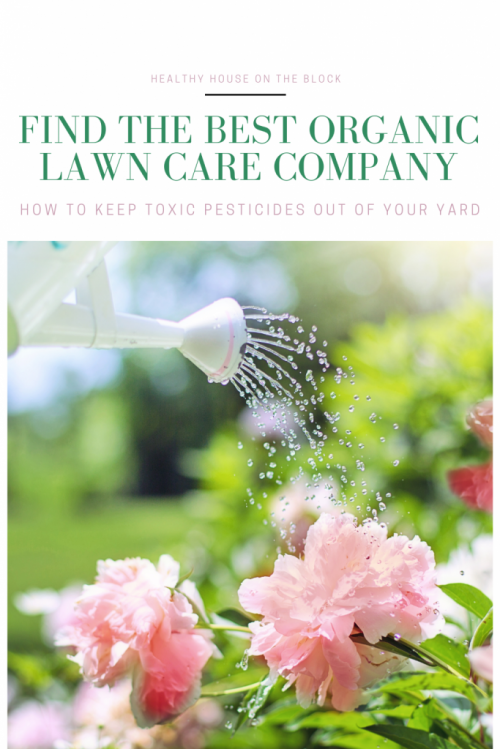
The crazy thing is that eight years ago when we moved in we couldn’t find an organic lawn care company, nor could we find organic lawn care products. However, this year is a TOTALLY different story. Once I started my search for the best organic lawn care treatments and products I was hit with SO many options.
And so in researching different organic lawn care products and finding an organic lawn care company, I learned MORE than I ever wanted to know about keeping a lawn green and keeping it safe for my family.
While I love a green, lush lawn, I also love the peace of mind I have when I know that there’s an organic lawn care company treating and taking care of it. I don’t have to feel unsure stepping out in bare feet or laying a blanket in the grass for a picnic.
Toxins in Typical Lawn Care
As always, I want to share with you WHY typical lawn care products and companies are unsafe and harmful to your health and your family’s health. There’s nothing more powerful than being armed with knowledge while you’re either calling to find an organic lawn care company or on the hunt for the best organic lawn care products. It gives you some terms to understand and some great questions to ask while you’re doing your digging.
Pesticides: Pesticides is a rather broad term to cover a variety of chemicals that kill and prevent pests from destroying your grass, plants and foliage. Basically, there’s a slew of different types of pesticides:
- Insecticide (targets insects)
- Fungicide (targets fungi)
- Herbicides (targets weeds)
- Antimicrobials (targets bacteria)
- Acaricides (targets mides and spiers)
- Rotentidices (targets mice and other rodents)
- Repellants (targets insects, birds and mammals)
Pesticides have been around for a long time and what research is finding is that they are highly toxic. One of the biggest problems with pesticides is not only are we using them in our own homes, but they’re also in our food, on our textiles and eventually they’re ending up in our house dust. (STUDY)
With this much constant exposure to pesticides, there’s bound to be some serious health repercussions. Immediate health effects are typical: allergic response, skin irritation, headache, respiratory irritation and eye irritation. Long term effects are much more serious and detrimental to our quality of living. Repeated pesticide exposure, even at low levels, has been linked to an increased risk for leukemia, depression, ADHD, Parkinson’s disease, asthma and non-Hodgkin’s lymphoma.
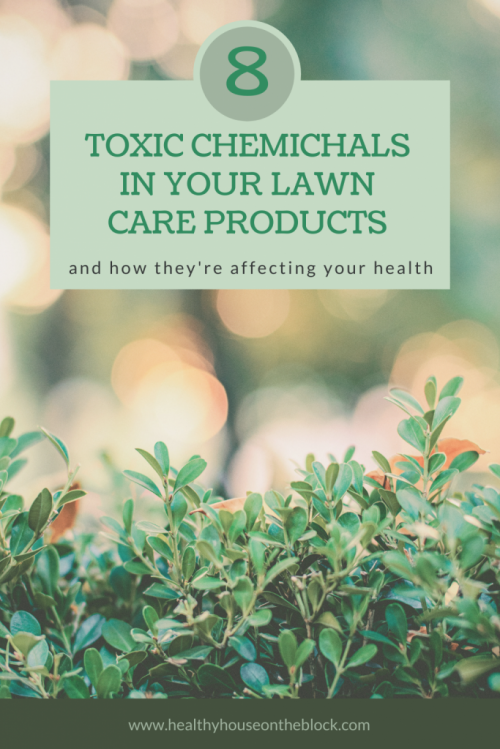
Insecticides: This chemical is an insecticide, which is typically used against a variety of insects and mites. It is designed so the insect or mite ingests the poisonous toxin, resulting in death. In humans, it can result in dermal rashes and discomfort (burning, itching numbness) as well as respiratory and nasal irritation, increased heart rate and gastrointestinal discomfort. Long term health effects are much more serious in nature, however. Bifenthrin is a possible human carcinogen. It has some endocrine disrupting properties that are most concerning to pregnant women and their babies. (RESEARCH).
And while insecticides of all kinds are toxic to humans, they’re also toxic to the world around us. Insecticides last in our ecosystem for long periods of time and are toxic to small mammals and aquatic life.(INFORMATION)
I fully intended to include a list of common insecticide names in this post, but you’d be scrolling for a LONG time. So, I recommend visiting this link to get a good idea of what insecticides are labeled as on packaging.
Herbicides: Herbicides are probably most commonly used in lawn care treatment as they target weeds and kill foreign plants that may choke out crops and grass. Just the same as general pesticide exposure, we’re being bombarded with herbicides in both our food and secondary in our own lawns. It also stays in our ecosystem for long periods of time and is toxic to mammals, aquatic life and bird life, affecting more than just our individual lawns and gardens.
Glyphosate: This is one of the most common herbicides that is used in lawn care and on our food products. Long term health effects in mammals (not necessarily humans) include liver and kidney damage, endocrine disruption resulting in developmental issues and reproductive issues. Possibly carcinogenic, glyphosate disrupts DNA in human cells and damages them. (STUDY) It has also been linked to shortened pregnancy in pregnant mothers. (INDIANA STUDY)
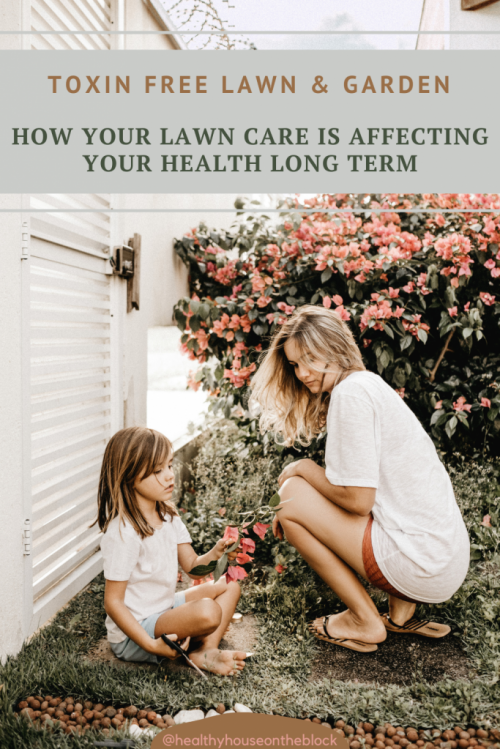
How to Find the Best Organic Lawn Care Company
What I learned in my own hunt for an organic lawn care company was that there really are no completely chemical free lawn care services. They can get close to toxin free, but in order to live up to the claims they make about caring for your lawn, there are a few chemicals involved in the process. These chemicals have been studied and show a low toxicity to humans. But I will also warn you that even natural toxins added to the lawn can be potentially harmful.
Lawn Doctor: Uses compost that contains fungi and bacteria to help the microbiome of your lawn. They also help your lawn by naturally stimulating natural soil life and improving root growth by building organic matter within the soil.
NaturaLawn of America: They use the philosophy: “is there a need?” Meaning, they don’t just add whatever *might* work to your lawn, but only apply what is specifically needed for your lawn.
BeeSafe Lawns: Through the idea of reducing stress on the lawn and increasing biological activity, the look and feel of your lawn is drastically improved. They stay away from harsh products that can sterilize the soil and ultimately harm the roots on your grass.
If you’re looking for the top organic lawn care companies in my home state of Minnesota, here’s the short list that we checked out for our own lawn:
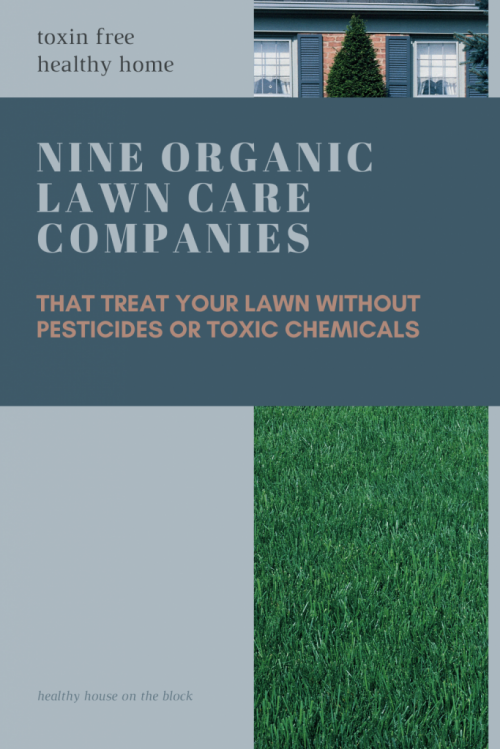
Organic Lawn Care Products You Can Buy
LawnBox: A subscription box for your lawn — no joke. They work with you to find out your lawn size, what type of soil you have and your climate to determine what nutrients your lawn needs. From grass seed to lawn food and insecticides that are 100% organic, they’ll send you what your individual lawn needs.
PurelyOrganic: With a line from garden seeds to line food to weed and grub preventers, Purely Organic has so many helpful products for garden and lawn. You can purchase them at Home Depot, Amazon and other hardware stores.
EcoScraps:A totally unique company that uses compost to create lawn fertilizer, soil mixes for gardens and pots and plant food. They use sustainable materials and processes in the production of all their products and there are NO synthetic chemicals or manures used. You can purchase right off their website or at Target.
Sunday Lawn Care: Another custom-made planning and product service for the DIYer. They’re products range from grass seed to dandelion spray and hose attachment fertilizers made from natural ingredients like seaweed, molasses and soy protein. They do mix in a few synthetics, but no synthetic pesticides are ever added.
Espoma: Organic lawn food for every season that is completely chemical free. It does contain nitrogen, which in large amounts is not ideal, but in the small percentage they use it’s safe for for kids and pets. You can find Espoma at many big box hardware stores or online.
Natural Alternative: It’s made by NaturaLawn Services for the DIY homeowner who wants to take care of their own lawn. They offer all season lawn food as well as pest control for mosquitos and ticks. Their products are separated into seasons and climate so you can make sure you’re getting just what your lawn needs.
LawnBright: Another subscription box company that utilizes kelp and other natural occurring materials and plants to fertilize your lawn. Other ingredients include cedar oil, cornmeal and molasses. If there was ever a lawn food that seemed safe enough for bare feet, this is it.

Organic Lawn Care DIYs
Cornmeal: Cornmeal can help weeds from germinating. You’ll only want to use it on well established areas of your lawn. If you use it after planting new seeds it will also prevent those from germinating as well.
Epsom Salt: Because it contains magnesium and sulfur, epsom salt is a perfect additive to activate chlorophyll production in the grass. You can simply add epsom salt to a spreader and walk around the lawn with it.
Vinegar: The acidity in vinegar is enough to kick the weeds to the curb. You’ll have to be careful when applying it in grass, however, because it’s so powerful it can also take a toll on your grass.
Essential Oils: Essential oils are great for preventing bugs and pests in the garden. You can dilute 30 – 50 drops of tea tree, peppermint or cedar with water and spray your lawn with it. Be careful with peppermint as this should not be used around pets.
Molasses: The high amounts of sugar in molasses help feed the soil microbes and in turn boosts plant health. You can purchase dried molasses flakes and sprinkle them into your lawn as a fertilizer.
This post is also a great resource when you’re looking for some toxin free lawn care tips that you can DIY at home.
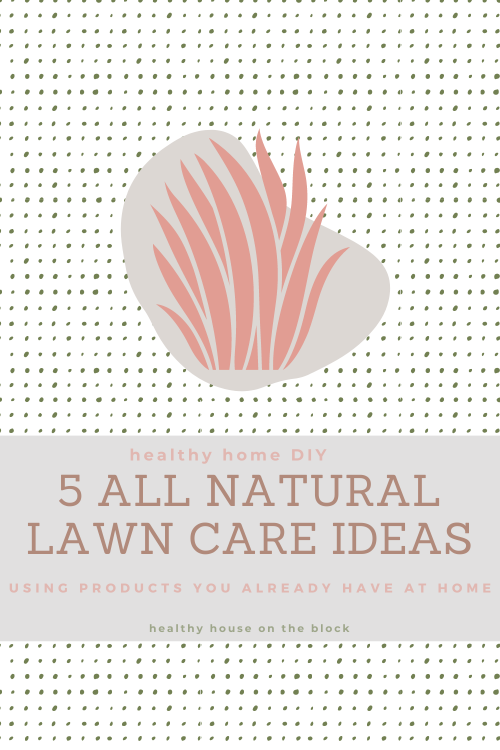
With summer here, it’s a great time to spend extra time outdoors. And your lawn can be both lush and beautiful as well as safe. By skipping the pesticides, you’re ensuring you and your family won’t be tracking them into your home as well. The best organic lawn care companies can help you accomplish this — or choose from the DIY products I mentioned and create your own organic lawn care routine.



